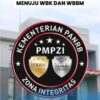
Angely Wahyuni Universitas PGRI Kanjuruhan Malang
The plague of drug use is now significantly threatening the health and welfare of the global populace. The danger is not limited to adults; it also affects school-aged children who are at risk of using drugs. According to the United Nations Office of Drugs and Crime Vienne’s book, School based – education for drug abuse prevention, education to prevent drug abuse is highly essential and may be described as an education program with the goal of improving community health at a young age. This prevention may be observed in official and informal health curriculum, in ensuring a safe and healthy environment, in providing health services and support in schools, and in including families and the community in the creation and execution of programs.
The components of school-based drug abuse prevention : First, create a drug abuse prevention program at school. The program will put an emphasis on informing and educating students about drugs, the harmful effects of drug abuse, life skills they may encounter in the future, such as how to deal with life’s difficulties and despair and how to defend themselves to prevent turning to drugs, as well as how to vigorously resist drug attempts if coerced or influenced by outside parties.
Second, safe and supportive school environment. In order to facilitate open communication between all students and teachers, staff, parents, relevant professionals, and police agencies, the school offers nursing, counseling, and support to all students and is as transparent as possible. This makes it easier to spot any signs that students are using drugs and to get quick treatment. Third, strategies for making sure that everyone in the school community participates in and supports the institution’s drug policy and procedure.
Fourth, appropriate professional development and training for concerned employees Fifth, advice and assistance for parents, especially those of pupils who use illegal or other non-prescribed drugs. And the last, mechanisms for ongoing assessment and monitoring of the institution’s approach to managing incidents and educating students about drug abuse.
Reference :
https://www.unodc.org/pdf/youthnet/handbook_school_english.pdf







